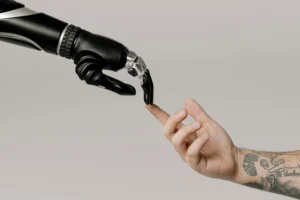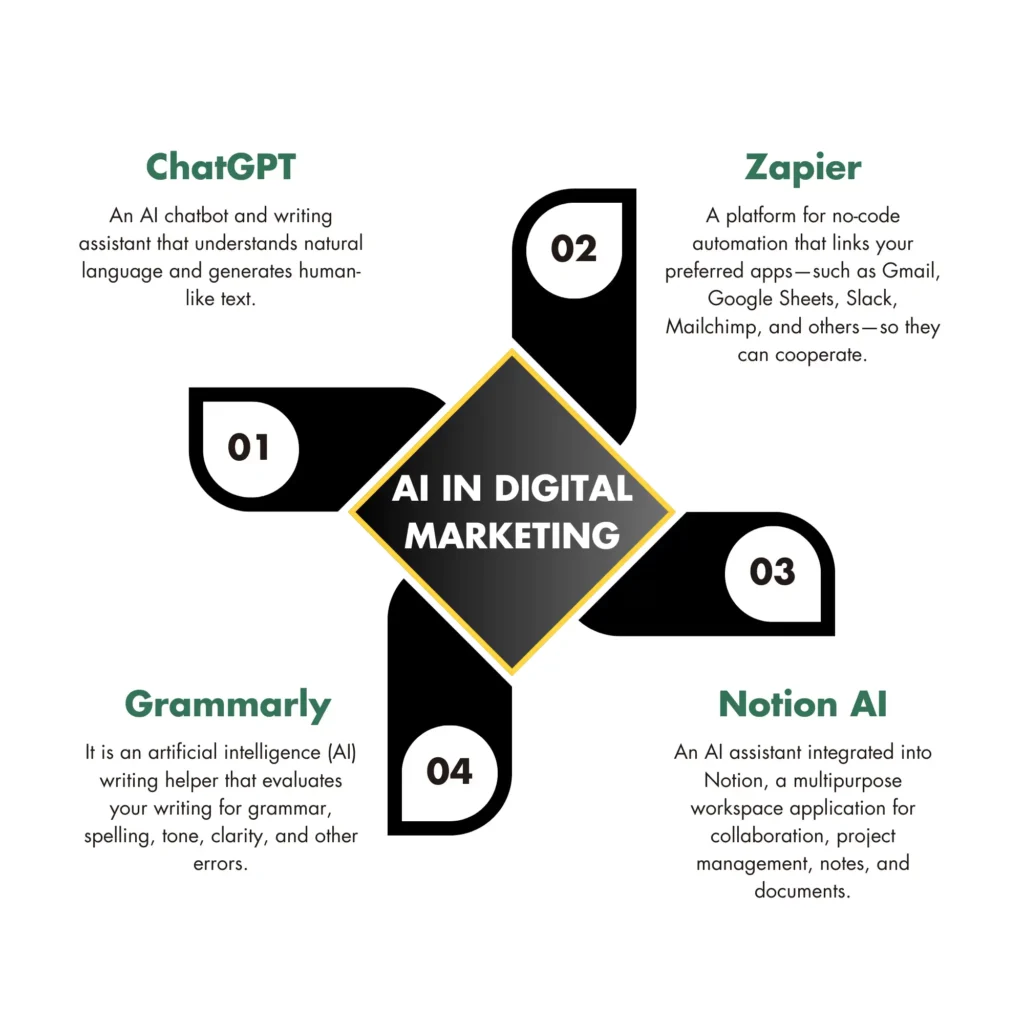AI IN DIGITAL MARKETING

Artificial Intelligence (AI) is taking over the world, integrating itself into most things we could ever imagine. It is no surprise to know how AI is transforming the digital landscape.
What once took hours to do is now done in seconds. Any complications, no worries, AI is there for rescue. From understanding consumer behavior to automating campaign management, AI in digital marketing is making great advances in integrating itself into digital marketing strategies.
It is high time that we discuss the importance of AI in Digital Marketing in depth to understand the various tools it provides as well as the pros and cons it beholds.
The Benefits of AI in Digital Marketing:
For your new online store, you’ve been running a digital marketing campaign. You’re sending out emails, posting frequently, and boosting a few posts, but the results are mediocre. You’re beginning to wonder if it’s worth the effort.
So, you decide to try something different and sign up for an AI-powered marketing tool, which begins to analyze your customer data, segment your audience, and suggest the best times to send emails. You even let it write the email copy.
You launch the next campaign, and this time, your open rates double. Sales begin to come in. The AI tool predicts which products will perform best next month and helps you create a campaign around them.
AI in digital marketing can truly transform your marketing campaigns which might surprise you, in short, integrating AI in digital marketing yields you following benefits:
- Enhanced customer insights.
- Personalization at scale.
- Automation of repetitive tasks.
- Improved customer service.
- Data-driven decision-making.
Table of Contents
TogglePopular AI Tools Used in Digital Marketing

ChatGpt:
An AI chatbot and writing assistant that understands natural language and generates human-like text.
It can be used to:
- Write ad text, product descriptions, emails, blogs, and social media posts.
- Create campaign tactics, FAQs, headlines, and a list of marketing concepts.
- Write chatbot flows or scripts for customer service.
Zapier:
A platform for no-code automation that links your preferred apps—such as Gmail, Google Sheets, Slack, Mailchimp, and others—so they can cooperate.
It can be used to:
- Add Facebook Ads leads to your CRM automatically.
- Notify Slack when a new email subscriber is added.
- Surfer SEO:
An AI-driven SEO tool that assists you in creating content that improves your website’s Google ranking.
It is used to:
- Examine the best-performing pages for a particular term.
- As you write, receive real-time SEO recommendations.
- Examine current pages and make necessary optimizations.
Grammarly:
It is an artificial intelligence (AI) writing helper that evaluates your writing for grammar, spelling, tone, clarity, and other errors.
It is used to:
- Edit and enhance ad content, emails, blog entries, and social media captions.
- Depending on your desired tone, make your writing more polished.
Notion AI:
An AI assistant integrated into Notion, a multipurpose workspace application for collaboration, project management, notes, and documents.
AI in digital marketing does help with daily tasks and erases most of the complications, but as much as it is helpful there are also many negative impacts to it. Let us understand the Pros and Cons of it:
Pros of AI in Digital Marketing:
- Efficiency: AI can complete a task in a few seconds, the same task a human might take hours to do.
- Cost-effective: By automating processes, AI can eventually reduce operating expenses.
- Scalability: AI enables companies to expand their marketing campaigns without having to increase the number of workforces.
Cons of AI in Digital Marketing:
- Lack of human touch: AI-generated content may lack emotional touch which sometimes may backfire.
- Data privacy concerns: AI relies mostly on data, and people are concerned about their data and privacy.
- Over-reliance: Extreme reliance on AI automation can lead to robotic encounters and missed opportunities for true engagement.

CONCLUSION
AI is no longer a science fiction but a reality. From content production to customer interaction, AI tools have transformed the way marketers work. They provide deeper insights, automate monotonous operations, and improve personalization like never before.
While the benefits are vast, it is critical to achieve the appropriate balance between AI automation and human inventiveness. The most successful digital marketing strategies will help AI to empower, rather than replace, human marketers.
So, yeah, you’d be shocked to see how much AI can do—but even more so when marketers collaborate with it.